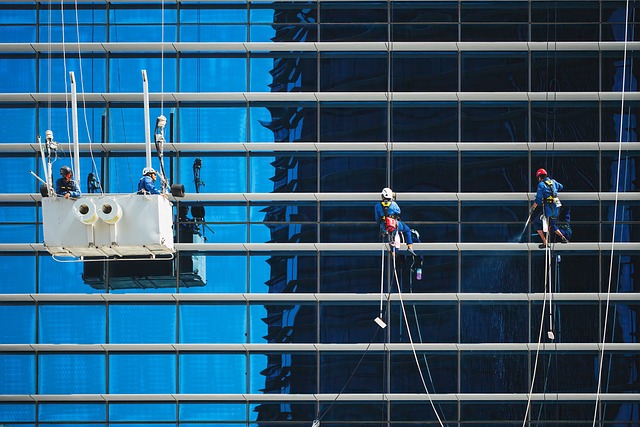Industrial complexes face unique roofing challenges due to their size, operations (e.g., heavy machinery, chemicals), and complex geometries. Industrial flat roofing is popular for cost-effectiveness but requires meticulous design to prevent leaks. Specialized industrial roofing services offer tailored solutions like advanced sealing, robust support, and customized repair programs. Materials include high-strength metals, concrete, single-ply membranes, EPDM, TPO, and energy-efficient cool roofs. Safety, compliance, regular inspections, and maintenance checks are crucial for longevity and efficiency. Case studies highlight successful transformations, demonstrating expertise in complex industrial roof projects.
In the realm of large-scale industrial complexes and manufacturing facilities, robust and reliable roofing is paramount. This article explores the specialized industrial roofing services essential for these critical environments. We delve into the unique challenges, from harsh weather conditions to heavy structural demands, and how expert providers navigate them. Discover the latest materials, technologies, and safety measures shaping the industry, along with the invaluable benefits of regular maintenance. Case studies illuminate successful projects, highlighting the transformative impact of superior industrial roofing services.
- Understanding Industrial Roofing Challenges
- Specialized Services for Large-Scale Complexes
- Materials and Technologies Used in Industrial Roofs
- Ensuring Safety and Compliance During Installation
- Benefits of Regular Maintenance Checks
- Case Studies: Successful Industrial Roofing Projects
Understanding Industrial Roofing Challenges

Industrial complexes and manufacturing facilities face unique challenges when it comes to roofing due to their massive scale and specific operational needs. These structures often house vast warehouse areas, intricate machinery, and critical equipment that demand robust and durable roof solutions. One of the primary concerns is ensuring the integrity of the roof system, as it must withstand extreme weather conditions, heavy loads, and constant exposure to industrial chemicals or pollutants.
Additionally, with long spans and complex geometries, installing and maintaining factory roofs can be a significant hurdle. Industrial flat roofing has become a popular choice due to its cost-effectiveness and ease of maintenance. However, these systems require meticulous design and installation to prevent leaks and ensure proper drainage. The right industrial roofing services understand these challenges and offer tailored solutions, such as advanced sealing techniques, robust structural support, and customized repair or replacement programs for warehouse roofing or any other type of factory roof system.
Specialized Services for Large-Scale Complexes

When it comes to industrial roofing services for large-scale complexes, specialized expertise is a must. These facilities often have unique challenges due to their size and operational demands. For instance, warehouse roofing requires robust materials that can withstand heavy loads and frequent traffic, while factory roof systems need to be designed with specific considerations for ventilation, lighting, and the efficient movement of machinery.
Specialized services cater to these needs by offering tailored solutions such as industrial flat roofing, which is known for its durability and low-maintenance characteristics. With advanced technologies and materials, professionals ensure that every aspect of the roof—from structural integrity to insulation efficiency—meets the exacting standards of industrial operations. This comprehensive approach guarantees not just a sturdy shelter but also optimal performance and cost-effectiveness over the long term.
Materials and Technologies Used in Industrial Roofs

Industrial roofing services often involve specialized materials and technologies designed to withstand the unique challenges of large-scale facilities like factories and warehouses. These structures demand robust and durable solutions, given their extensive size and heavy operational loads. Common materials include high-strength metals like steel and aluminum, as well as concrete tiles or slabs for flat roofs. These options not only ensure structural integrity but also offer long-term resistance to harsh weather conditions typical of industrial settings.
Advanced technologies play a significant role in modern industrial roofing. Systems such as single-ply membranes, EPDM (ethylene propylene diene monomer), and TPO (thermoplastic polyolefin) are popular choices for their exceptional water tightness, ease of installation, and superior life spans. Additionally, energy-efficient options like cool roofs utilize reflective materials to reduce interior temperatures, contributing to lower operational costs. These innovations cater to the diverse needs of various warehouse roofing and factory roof systems, ensuring optimal performance under demanding conditions.
Ensuring Safety and Compliance During Installation

When providing industrial roofing services for large complexes or manufacturing facilities, ensuring safety and compliance is paramount. With structures often spanning vast areas, intricate designs, and diverse materials, meticulous planning and adherence to regulations are non-negotiable. Professional contractors employ robust safety protocols, including comprehensive training for workers, utilisation of protective gear, and strict adherence to industry standards. Regular inspections and quality control measures throughout the installation process guarantee that every aspect aligns with safety requirements.
Factory roof systems, warehouse roofing, or industrial flat roofing require a deep understanding of structural integrity and weatherproofing. Contractors must consider factors like load-bearing capacity, ventilation needs, and resistance to extreme conditions. By staying up-to-date on building codes and incorporating innovative technologies, they ensure not only the longevity of the roof but also its effectiveness in protecting the facility’s assets below.
Benefits of Regular Maintenance Checks

Regular maintenance checks for industrial roofing services are a crucial aspect of ensuring the longevity and efficiency of your facility’s roof. In the fast-paced world of manufacturing and industry, where time is money, proactive measures can significantly reduce downtime. By scheduling routine inspections, you can identify potential issues early on, preventing small problems from escalating into major repairs or costly replacements.
These checks allow for a comprehensive evaluation of factory roof systems, warehouse roofing, or industrial flat roofing. Skilled professionals can assess the overall structural integrity, check for leaks, and evaluate the condition of critical components such as flashing, gutters, and drains. Regular maintenance also helps to ensure that your roof is performing optimally, contributing to energy efficiency by maintaining proper insulation and preventing heat loss or gain.
Case Studies: Successful Industrial Roofing Projects

In the realm of industrial roofing services, successful projects stand as testaments to the expertise and innovation that go into safeguarding massive facilities from the elements. Consider a recent case study involving a sprawling manufacturing complex where our team was tasked with replacing an outdated and leaking warehouse roof. Through meticulous planning and utilizing advanced flat roofing materials, we accomplished a complete overhaul in record time with minimal disruption to the facility’s operations.
This project showcased not only our proficiency in handling large-scale industrial roofs but also our commitment to implementing cutting-edge solutions like high-performance insulation and drain systems. Similarly, another notable assignment involved retrofitting a factory roof system to enhance energy efficiency and sustainability. By integrating eco-friendly materials and designing a sloped roof that met both structural and aesthetic requirements, we achieved a remarkable transformation that aligned with the client’s environmental goals.
